1 Aug 2017
University launches appeal to support dementia research
Loughborough University has launched a fundraising appeal to support innovative research into dementia.
Led by Professor Eef Hogervorst, the research aims to transform dementia care, diagnosis and prevention methods, and to save the lives of thousands each year.
The project’s multidisciplinary approach combines the work of academics in the Schools of Sport, Exercise and Health Sciences, Mechanical, Electrical and Manufacturing Engineering, Social Sciences, Chemistry, and Loughborough Design School.
The research falls into three core areas:
- Building daily defences
- Finding lost connections
- Redesigning our world
Professor Hogervorst’s research, ‘building daily defences’ focuses on nutrition and exercise. Loughborough researchers have found that fermented soy can delay the onset of dementia, with further studies revealing that resistance or strength training is beneficial in slowing the cognitive and physical decline of people suffering with dementia.
‘Finding lost connections’, Professor Elizabeth Peel’s focus, is centred on communication in dementia care and in families affected by the disease, as well as the experience of family carers.
Professor Sue Hignett’s research, ‘redesigning our world’, examines the design of hospitals, ambulances and homes, as well as evaluating medical devices, staff wellbeing and patient safety.
It includes the dementia house project – an intelligently designed home which seeks to meet the needs of those living with dementia.
Professor Hogervorst said: “The cost of treating people with dementia is around £27 million per year in the UK, but this isn’t the full picture. The human costs are much more - the suffering of those associated with the disease and their families is immeasurable. Our research wants to alleviate these costs.
“Our collaborative approach to dementia addresses the physical, mental and societal impact of this global medical problem.
“The ambition is to revolutionise the way dementia is diagnosed and treated, and ultimately we want to improve the nation’s quality of life, including those with dementia and their family and friends.”
Rachel Third, Head of Philanthropy at Loughborough University, said: “Dementia affects so many people. Some of our leading dementia researchers themselves have lost family members to the disease and this has made them all the more determined to improve the way we treat, diagnose and prevent dementia.
“Every donation will have an impact because our research can be applied directly to benefit people affected by dementia in everyday situations. For instance, we have already seen an impact through our research into ambulance and hospital design – ensuring that changes are made to alleviate anxiety when dementia sufferers are at their most vulnerable.
“With support from the Loughborough family and community, we can ensure our academics can continue making improvements for those who are affected by this devastating disease.”
Further information on the research, and how to support it, is available here.















